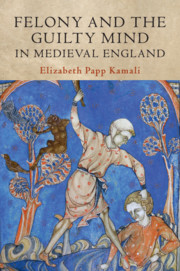Crossref Citations
This Book has been
cited by the following publications. This list is generated based on data provided by Crossref.
Hale, Matthew
Raymond, Graham
and
Wright, Catherine
2020.
List of publications on the economic and social history of Great Britain and Ireland published in 2019.
The Economic History Review,
Vol. 73,
Issue. 4,
p.
1153.
Rabin, Andrew
2020.
Crime and Punishment in Anglo-Saxon England.
Auerbach, Sascha
2021.
Armed with Sword and Scales.
Lobban, Michael
2021.
Imperial Incarceration.
ISMAIL, Benhaddou
NAZIM, Bellifa
and
MOHAMED, Achouri
2021.
Drug addiction profile and monitoring liver functions tests of addicts at a specialized psychiatric treatment center.
Journal of Surgery and Medicine,
Vol. 5,
Issue. 1,
p.
55.
Ash-Irisarri, Kate
Atkinson, Laurie
Black, Daisy
Brazil, Sarah
Calder, Natalie
Finn, Andrew
Greene, Darragh
Grossman, Joel
Lazikani, Ayoush
Menmuir, Rebecca
Pascual, Rafael J
Sargan, J D
and
Wolf, Johannes
2021.
III Middle English.
The Year's Work in English Studies,
Vol. 100,
Issue. 1,
p.
195.
McDougall, Sara
2022.
Judging sexy women in late medieval France.
postmedieval,
Vol. 13,
Issue. 1-2,
p.
81.
V.O., Chukwuma
2023.
A Legal Analysis of the Pre-Colonial Igbo Peoples’ Perspective to Criminal Justice.
African Journal of Culture, History, Religion and Traditions,
Vol. 6,
Issue. 1,
p.
16.
Strand, Michael
2023.
Handbook of the Sociology of Morality, Volume 2.
p.
323.
Allen, Elizabeth
2023.
Medieval sanctuary, gothic entrapment, and the fugitive self in Colson Whitehead’s The Underground Railroad.
postmedieval,
Vol. 14,
Issue. 1,
p.
149.
Kamali, Elizabeth Papp
2023.
Finding Facts in Medieval English Law.
Journal of Legal Analysis,
Vol. 15,
Issue. 1,
p.
158.
Flatto, David C.
2024.
Evidently Not: Why Confessions Are Excluded in Jewish Criminal Jurisprudence.
Journal of Law and Religion,
Vol. 39,
Issue. 2,
p.
173.
2024.
Trials of Sovereignty.
p.
369.
Minieri, Jessica L.
2024.
Between freedom and unfreedom: imprisonment and crime in premodern Europe.
European Review of History: Revue européenne d'histoire,
Vol. 31,
Issue. 3,
p.
520.
2025.
From Masters of Slaves to Lords of Lands.
p.
441.
2025.
Judges, Judging, and Judgment.
p.
174.



